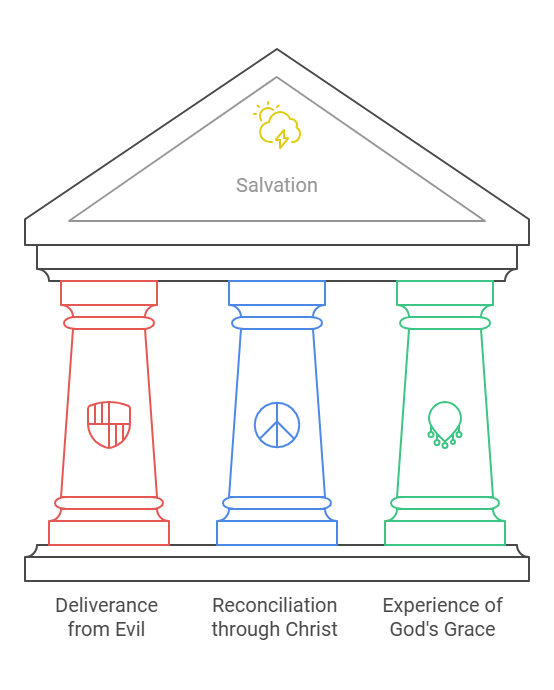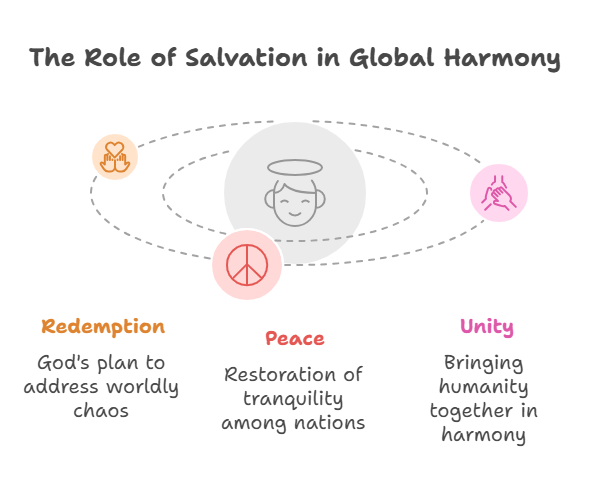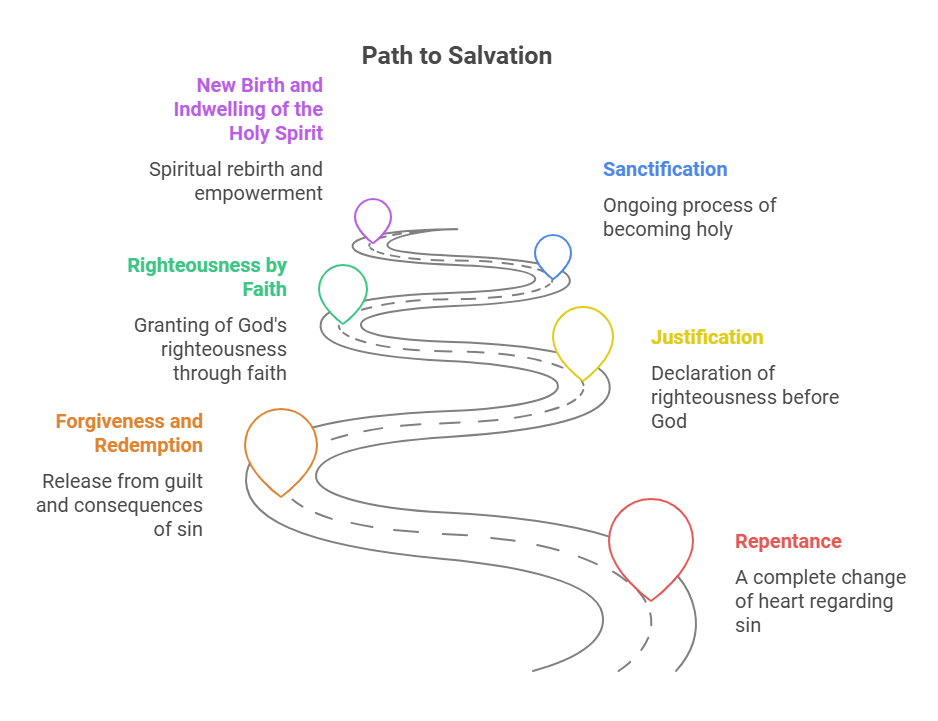Salvation is not just a concept; it is the cornerstone of hope, freedom, and transformation in the life of every believer. Without it, humanity remains lost, but through it, we are found, restored, and made whole.
There are many misconceptions about this concept while many modern-day Christians fail to comprehend its meaning and importance.
This first part of the discipleship aims to explore the meaning and importance of salvation. So, what really is salvation?
Definitions of Salvation:
- Salvation is the deliverance from sin, death, and all evil on earth.
- Salvation is God’s only way to reconcile with mankind through the person of Jesus Christ.
- Salvation is the experience of God’s grace to deliver mankind.

Let us examine each of these meanings in detail.
1. Salvation is the Deliverance from Sin, Death, and All Evil on Earth
To grasp the concept of salvation, we must first understand the concept of sin and death.
Sin is a state of disobedience toward God. It is an act of being morally wrong, as defined by the Word of God. Sin can also be described as missing the mark – failing to fulfill one’s God-given purpose on earth.
But where did sin originate if God created mankind perfectly? Sin originated in heaven with Satan. Ezekiel 28:15 reveals that iniquity (sin) was found in the heart of Satan. From him, sin passed to Adam and Eve when they chose to eat from the tree of the knowledge of good and evil (Genesis 3:6). It is important to understand that sin was not merely the act of eating the fruit but the decision to disobey God’s command.
Scriptural Reference
- Romans 5:12: “Wherefore, as by one man sin entered into the world, and death by sin; and so death passed upon all men, for that all have sinned.” (KJV)
If Adam had not sinned, all mankind would have remained immortal. This first sin brought about all the chaos we face in the world today: killings, robbery, corruption, and all other vices that result in death. These consequences are the result of the fall of man.
God gave Moses the Ten Commandments to help curb transgressions, but as scripture shows, no one is capable of keeping them perfectly. Hence, redemption from sin required the intervention of one man—Jesus Christ.
2. Salvation is God’s Only Way to Reconcile with Mankind Through Jesus Christ
Since Adam’s sin, the entire Bible is a narrative of God’s mission to reconcile with His creation. He orchestrated a divine plan to redeem humanity from sin.
Scriptural Reference
- 2 Corinthians 5:17-18: “Therefore if any man be in Christ, he is a new creature: old things are passed away; behold, all things are become new. And all things are of God, who hath reconciled us to himself by Jesus Christ, and hath given to us the ministry of reconciliation.” (KJV)
To be reconciled with God means to be restored to the original state God intended for mankind: holy and in His image. God sees humanity in two categories:
- The First Adam (fallen man)
- The Second Adam (Jesus Christ)
Those who are born again are seen by God as righteous and holy, just as Jesus Christ is.
3. Salvation is the Experience of God’s Grace to Deliver Mankind
The process of salvation is through grace by faith in Jesus Christ.
Scriptural Reference
- Ephesians 2:8-9: “For by grace are ye saved through faith; and that not of yourselves: it is the gift of God: not of works, lest any man should boast.” (KJV)
No one can earn salvation through their own efforts, such as giving to charity, praying, or performing good deeds. Salvation is a divine gift of grace, accessed through faith in Jesus Christ.
Scriptural Reference
- Romans 10:9: “That if thou shalt confess with thy mouth the Lord Jesus, and shalt believe in thine heart that God hath raised him from the dead, thou shalt be saved.” (KJV)
This is the essence of the gospel: Jesus Christ, born of the Virgin Mary, gave His life on the cross, died, and was resurrected to sit at the right hand of the Father.
Importance of Salvation
Why is salvation significant? God’s plan of redemption addresses the chaos of the world: nations fighting for power, violence, family strife, and societal divisions. Only through Christ Jesus can humanity be saved and restored to peace and unity.

Salvation Doctrine in Christianity
The doctrine of salvation in Christianity encapsulates a sevenfold process:
- Repentance: (Greek: Metanoia) A complete change of mind about a person’s errors and misdeeds resulting in a determination to enter a better course of life. It involves both recognition of sin and sorrow for it.
- Romans 3:23: “For all have sinned and fall short of the glory of God.”
- 2 Peter 3:9: “The Lord is not slow to fulfill his promise as some count slowness, but is patient toward you, not wishing that any should perish, but that all should reach repentance.”
- Forgiveness: Pardon, remission of sins, and freedom. Implies you are set free from the penalty of sin, which is death. Jesus Christ ransomed you and you do not have to come before him feeling guilty of sin.
- Ephesians 1:7: “In whom we have redemption through his blood, the forgiveness of sins, according to the riches of his grace.”
- Justification: The state of being rendered just or innocent through faith in Jesus Christ. Justification is not by works but by faith.
- Romans 3:24: “Being justified freely by his grace through the redemption that is in Christ Jesus.”
- Romans 3:28: “Therefore we conclude that a man is justified by faith without the deeds of the law.”
- Righteousness: Attained through faith of the Son of God, Jesus Christ, not by works.
- Romans 3:22: “Even the righteousness of God which is by faith of Jesus Christ unto all and upon all them that believe.”
- Philippians 3:9: “And be found in him, not having mine own righteousness, which is of the law, but that which is through the faith of Christ, the righteousness which is of God by faith.”
- Sanctification: Purity, holiness, and consecration. Sanctification is wrought by the Holy Spirit, making you holy as God is holy.
- 1 Corinthians 1:30: “But of him are you in Christ Jesus, who of God is made unto us wisdom, and righteousness, and sanctification, and redemption.”
- 1 Peter 1:2: “Elect according to the foreknowledge of God the Father, through sanctification of the Spirit, unto obedience and sprinkling of the blood of Jesus Christ: Grace unto you, and peace, be multiplied.”
- New Birth: What it means to be born again. The regeneration of a man’s spirit to enable the indwelling of the Holy Spirit.
- John 3:5-6: “Jesus answered, Truly, truly, I say to you, unless one is born of water and the Spirit, he cannot enter the kingdom of God. That which is born of the flesh is flesh, and that which is born of the Spirit is spirit.”
- John 14:16: “Even the Spirit of truth, whom the world cannot receive, because it neither sees him nor knows him. You know him, for he dwells with you and will be in you.”
- Eternal Life: Everlasting life with God, life without beginning and end, characterized by immortality and fulfillment in God’s perfect plan.
- John 3:16: “For God so loved the world, that he gave his only Son, that whoever believes in him should not perish but have eternal life.”
- Ecclesiastes 3:11: “He has made everything beautiful in its time. Also, he has put eternity into man’s heart, yet so that he cannot find out what God has done from the beginning to the end.”

Digest Questions
1) What are the steps to salvation?
The first step towards salvation is repentance (complete change of heart towards sinning), Results in confession and professing the Lordship of Jesus Christ. The second stage is forgiveness and redemption from sin. The third phase involves justification. The fourth is attaining the righteousness of God by faith of Jesus Christ. The fifth is sanctification as you are consecrated to be Holy. The sixth is the understanding of the new birth and the indwelling of the Holy Spirit. Finally, one receives eternal life, which is an inheritance that is incorruptible and everlasting.
2) What is the meaning of repentance, and is it necessary for salvation?
Repentance is derived from the Greek word metanoia, which means complete change of mind concerning sin that results in conviction of righteousness as one desires to change their course of life.
3) Can a Christian lose salvation?
Once the doctrine of salvation is understood, a Christian cannot lose their salvation. A Christian is separated from sin – the old man and his deeds are done away with for the regeneration of a new creature (2 Corinthians 5:17). This revelation means that once the spirit of a man is regenerated, you cannot revert the process. Hebrews 6:4-5 refers to this as re-crucifying Jesus Christ, which is impossible. However, there are people who engage in the sin of apostasy – that is they have hardened their hearts from receiving the light of the gospel. Christ said of them; “For this people’s heart has grown dull, and with their ears they can barely hear, and their eyes they have closed, lest they should see with their eyes and hear with their ears and understand with their heart and turn, and I would heal them” (Mathew 13:14-15).
4) What is the way of salvation?
Jesus Christ. John 14:6 “Jesus said to him, I am the way, and the truth, and the life. No one comes to the Father except through me”.
5) What does it mean that salvation is by grace through faith?
Grace is the system of divine enablement that enables us to be righteous. This righteousness we attain by faith of the Son of God, Jesus Christ. We cannot work enough and engage in our own self-righteousness for us to be reconciled with God. This reconciliation is only through faith in the son of God.
6) What does it mean to work out your salvation with fear and trembling?
To work out your salvation does not mean that after being saved you can start to do the right things to please God, including giving, fasting, praying, helping the poor etc. It is the grace of God working in us that enables us to work out these righteous practices. If you read across the entire passage of Philippians 2:12-13 “work out your own salvation with fear and trembling, for it is God who works in you, both to will and to work for his good pleasure” We are not working out our salvation by our own strength, but it is through God who works in us by the grace and the power of the Holy Spirit.
7) Is it possible not to attain salvation?
There is only one way in which a person cannot be saved – and that is through the unforgiveable sin of blaspheming the Holy Spirit. Blaspheming the Holy Spirit (Mathew 12:31) means denying the saving grace of the Holy Spirit. Remember that the New Birth is a birth of the Spirit and if you are not born of the Spirit you shall not enter the kingdom of God. Thus, this scripture only applies to the unbelievers and not born again Christians.
References
The Holy Bible, King James Version (KJV)
The Holy Bible, English Standard Version (ESV)
Blue Letter Bible Online Study Resource


Great insights, keep writing
Thank you, Mary.